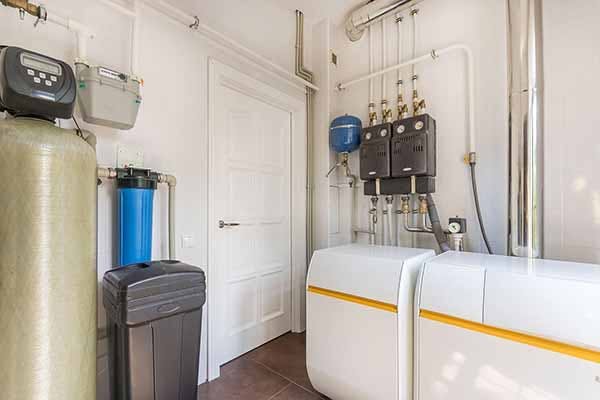May 2022
What Does a Water Softener Do and How Does It Work?
You may have heard your plumber or someone else advise you to install a water softener if you have hard water, but found yourself wondering, "How does a water softener work and what does it do?"
Hard water can damage your water pipes or cause a limescale buildup in your appliances, thus reducing their effectiveness and lifespan. Likewise, hard water can cause damage to your hair, your skin, and your clothing. By softening your water supply, you can protect your home from harmful buildup and rid yourself of limescale at the same time.
What Does a Water Softener Do?
A water softening system removes mineral deposits from your hard water — specifically calcium carbonate ions and magnesium ions — by using ion exchange technology and replacing them with sodium or potassium ions to reduce the amount of hardness in the water.
A salt brine solution runs through the resin bead base, exchanging calcium and magnesium ions with soluble sodium ions.
Water softeners don't remove toxins or bacteria — they’re not water filters and aren’t intended to do water treatment or filtration.
Which Type of Water Softener Is Best?
Now that you know how a water softener works, we’ll explore the four main types of water softener systems that dominate the market. What’s best for you depends on your needs.
- Magnetic softening systems
- Salt-free softeners
- Salt-based softeners
- Dual-tank softeners
The following is a little bit of information about each type and how these water softeners work.
Magnetic Water Softening Systems
A salt-free system, magnetic (electric) softeners don't remove heavy minerals from your water but instead use a magnetic field to neutralize them by stripping them of negative or positive ions. Once the charges are withdrawn, minerals can no longer bond, so they remain soluble.
Suitable for small spaces, these softeners attach to your water pipe. Some magnetic water softening systems do, however, require electricity to function.
For those with medical conditions that require a low-sodium diet, a magnetic water softener may be a good option, given that these systems are salt free.
Sodium-Free Water Softening Systems
As the name indicates, sodium-free softening systems also skip the salt to do their job. Instead of removing minerals from your water, they use polymeric beads that don't remove the mineral deposits but rather attach them to microscopic nucleation sites. This is called a template-assisted crystallization (TAC) system.
When minerals stick to the nucleation sites, they’re neutralized and form crystals. Then the crystals detach but don't bond to anything, so they don't cause mineral buildup.
Salt-free systems are usually more expensive when it comes to the upfront cost of purchasing the unit, but they require no maintenance, recharging, or electricity. In addition, since salt-free systems last for about three years, the savings are in the unit's life.
Salt-free systems are a good choice for any size of home because they’re usually smaller than salt-based water softeners. However, they may not be as effective as a salt-based system for very hard water or homes with heavy water usage.
Salt-Based Water Softening Systems
Most folks have a salt-based water softener in their home. That's because they’re effective and affordable. Salt-based water softeners are available in many different sizes, and they’re a good choice for most homes, recreational vehicles like motorhomes and RVs, and offices.
Salt-based softeners are typically mid-range in price, and while they add sodium to your water, it usually isn't enough to be noticeable. Salt systems usually do their job through an ion exchange — calcium and magnesium for sodium ions.
Sodium-based systems need regular, weekly maintenance because the resin runs out and must be recharged with salt. Salt-based systems are usually pretty big, so not best suited to small spaces.
Dual-Tank Water Softening Systems
The salt-based dual-tank system has two resin tanks. A dual-tank system best serves households that get their water from a well, because the double tank can do a better job of filtering heavy minerals.
Dual-tank water softeners work pretty much the same way as traditional salt-based systems. The difference is that when one of the tanks is in its regeneration cycle, the other provides soft water to the dwelling.
Dual-tank softening systems are overkill for most households, and because of their size, they can be challenging to install. More expensive upfront and with a need for regular recharging, the upside of a dual-tank system is that they can process more water per cycle, so the home never runs out of treated water.
How Much Water Softener Salt Should I Use?
For the best performance, your brine tank should always be at least a quarter full of salt and no more than four to six inches from the top. In addition, the salt level should always be above water level.
Before adding fresh salt pellets, check to see if there’s any salt caked onto the insides of the tank. If there are, break those up. If the salt forms a big mass (bridging), you'll need to break it down, which is most easily done by pouring hot water over it.
The amount of salt you'll need will depend on your water softener. If your unit is the right size and is programmed correctly, you'll likely use 40 to 50 pounds of salt each month. It's important to review your salt levels every month.
How Do I Choose the Right Water Softener?
Water softener systems are plentifully available on the market. However, choosing the right one for you really depends on your preferences or needs. For example, some people decide to soften only the water they shower or bathe with and select a point-of-use softening system placed on their showerhead or tub spigot.
Others may select a whole-house system if they have no medical reason to do otherwise. This will ensure that the water they drink, cook, or clean with is softened. The advantage to selecting a whole-house system is that soft water is easier on your home's water pipes and appliances such as your dishwasher, washing machine, and water heater.
How Much Does a Whole-House Water Softener System Cost?
Considering that the average lifespan of a water softener is about 15 years, the system's upfront cost is economical. On average, expect to pay $1,000 to $2,000 with installation and the system.
Can a Water Softener Be Installed Outside?
Water softeners are usually positioned near your home's plumbing system, typically close to where the water enters. Sometimes the system is fitted with a bypass system so that water that enters the house can be used for drinking, cleaning, and bathing, but not for irrigation or watering the garden or outdoor areas.
Salt-based, dual-tank, and some salt-free water softeners can take up a lot of space. So outdoors is sometimes the only option.
You can install most water softening systems outdoors. However, the elements (wind, rain, sun, or snow) will probably be hard on the system, reducing its lifespan. Therefore, it’s important to house the system to protect it from the weather.
The best place for your water softening system is on level ground, near the water's point of entry into your home. If your home's water source is healthy water, the entry point is typically next to the pressure tank. If you get city water, it's usually next to the water meter.
Is It OK to Drink Softened Water?
It's OK to drink softened water. Some folks may find the taste preferable to hard water.
However, those who have high blood pressure or another health condition for which salt is contraindicated may want to consider an alternative to a traditional sodium-based water softening system and go with a potassium-based system. That's because of the sodium ions present in traditionally softened water.
Having a water softening system in your home means that you can fill your water bottle up throughout the day, helping to ensure that you drink as much water as you need to stay hydrated.
Do I Really Need a Water Softener?
You don't necessarily need to soften your water. Hard water is typically perfectly safe to drink and use to bathe, cook, and clean. However, the decision to soften your water could help save your household appliances that run with water, as well as your plumbing.
If your faucets, shower doors, and dishwasher or washing machine have soap scum and scale buildup, it's a good indication that you could use a water softener.
It's a good idea to conduct a water test to see how prevalent the hard water minerals are in your water supply. At the same time, you'll be able to get a clear picture of your water quality and any contaminants that may be present. If your water proves to be hard, use your knowledge about how a water softener works and what it does to help you invest in a system. It will go a long way toward extending the life of your appliances and water pipes.
If your goal is to have clean, filtered water that’s also softened, you’d be wise to go with a whole-house water filtration system like those offered by HomeWater. A good whole-house filtration system can rid your water supply of harmful toxins and chemicals as well as filter your water for heavy minerals without using salt. Get in touch to learn more about HomeWater’s Softeners.
Want to learn more about which kind of system may be best for you? Reach out and talk to one of our specialists today.
Brought to you by homewater.com
All images licensed from Adobe Stock.
Featured Image

